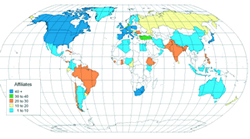Vol.
25 No. 5
September-October 2003
Why
Become an Affiliate?
The IUPAC
Affiliate Membership Program was approved by the IUPAC Council
in 1983. It was initially designed to get people interested
and involved in IUPAC affairs and activities. Recently, however,
the Union has changed and restructured itself in many ways,
while the program has continued unchanged, on a self-supporting
basis and without much review. Today, there is a growing feeling
that the 20-year old program needs a tune-up! A redesigned
program should not only take into account, but also complement,
the other recently restructured programs, such as the project-driven
system, through which people can become directly involved
in IUPAC projects. While some officers are thinking about
how to improve the program and its management, and how to
better engage the National Adhering Organizations to do their
parts, Chemistry International asked Laura
Abernathy to briefly review the benefits of being an Affiliate
Member. If you are reading CI, it is most likely that you
are already an Affiliate-but keep reading, as the program
offers more than you might think!
by
Laura Abernathy
 |
| IUPAC
values every Affiliate throughout the world, from the
one in Algeria, to the tens in Ireland, to the hundreds
in Germany, to the thousands in the United States. (Larger
view) |
Imagine
a beaker without measurement lines. Imagine a chemist in Hungary
who communicates research data to a chemist in Australia,
yet because the two are using different terminologies, neither
can recognize that they are using the same compound. Imagine
that a researcher in Canada could provide solutions for an
environmental concern in Latin America, but because the problem
is never communicated, the issue is never addressed.
IUPAC
provides the infrastructure to resolve these problems. The
work of IUPAC is a necessity for the continued development
of chemistry and chemistry applications, and is almost entirely
the result of volunteer efforts. Individuals from different
countries unite in working on chemistry-related issues with
the goals of developing solutions and initiating standards.
Supporting
IUPAC is being a member of a division, participating in project
task groups, and attending IUPAC-sponsored conferences; it
is also supporting IUPAC through the act of being an Affiliate.
By joining the IUPAC Affiliate Membership Program, chemists
from around the world show their support for IUPAC and its
mission to promote international chemistry research and standards.
The support and encouragement of every individual Affiliate
is as vital to IUPAC as the work of Divisions and task groups.
In
appreciation and acknowledgement of the support of its Affiliates,
IUPAC provides bimonthly updates on its activities through
Chemistry International. Affiliates receive discounts
on specific IUPAC publications, including Pure and Applied
Chemistry, and reduced registration fees for most IUPAC-sponsored
conferences. The bimonthly IUPAC e-news update provides the
latest IUPAC news and Web site updates (join at <www.iupac.org/news/e-news.html>.
. . you may unsubscribe at any time).
For
chemists in developing countries, IUPAC sponsors a limited
number of free Affiliate memberships. For every new paid Affiliate
Member, IUPAC can offer a young chemist from a developing
country the opportunity to participate within IUPAC as an
Affiliate Member.
IUPAC
Affiliates are part of an international network of chemists,
actively contributing to the development of chemistry and
chemistry standards. Today, there are nearly 5000 chemists
in the Affiliate Membership Program.
Encourage
your colleagues to consider becoming Affiliates to support
the IUPAC network. For more information about joining the
Affiliate Membership Program visit the IUPAC Web site.
For
additional questions or comments, contact Laura Abernathy
at <[email protected]>.
Laura
is part of the staff at the IUPAC Secretariat, where she has
worked since December 2002 as a communications specialist.
www.iupac.org/affiliates
Page
last modified 3 September 2003.
Copyright © 2002-2003 International Union of Pure and
Applied Chemistry.
Questions regarding the website, please contact [email protected]
|